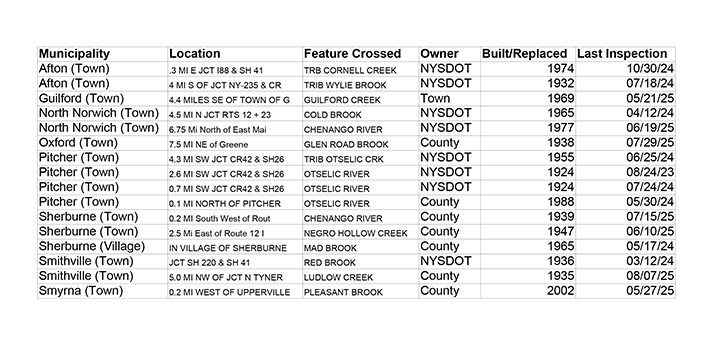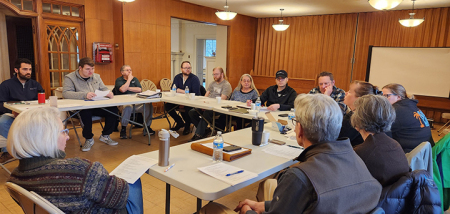Chenango County Department Of Health: The Importance Of Infant And Childhood Vaccinations
Published:
April 26th, 2022
By:
CHENANGO COUNTY — National Infant Immunization Week is April 24 through April 30, and the Chenango County Department of Health is taking this opportunity to remind the community of the importance of infant and childhood vaccinations.
Vaccines are among the most successful and cost-effective public health tools available for preventing disease and death. Vaccines help protect both individuals and communities by preventing and reducing the spread of infectious diseases. Among children born during 1994-2018, vaccination will prevent an estimated 419 million illnesses, 26.8 million hospitalizations, and 936,000 deaths over their lifetimes.
Vaccines were developed to protect individuals from disease. Vaccines are safe and effective while the diseases they protect against are still dangerous and still a threat. Deciding not to vaccinate not only puts the health of that child at risk, but it also affects the rest of your family, the health of your child’s friends and their families, classmates, neighbors, and community.
While most parents choose the safe, proven protection of vaccines, others are hesitant. Chenango County Immunization Coordinator Mary Klockowski, RN, says that “some parents hesitate to vaccinate their child because they are either not familiar with the diseases these vaccines protect us from, or they are not aware of the harm that these diseases can do.”
For example, the vaccine DTaP provides protection from diphtheria, tetanus, and pertussis. Diphtheria is a potentially fatal disease. This bacterial infection causes a blockage in the back of the throat that restricts a child’s breathing. Diphtheria can also paralyze throat muscles making swallowing impossible and cause heart, kidney, and nerve damage.
Tetanus is a bacterium present in soil and enters the body through a cut or puncture wound. Once it is in the body it releases a toxin that causes severe and painful muscle spasms. Because of the spasms the throat and windpipe can be blocked causing death by suffocation.
Oftentimes, tetanus effects the muscles of the jaw causing “lockjaw." And pertussis, commonly called whooping cough, presents with a thick sticky mucus that clogs the child’s windpipe. Besides a painful and persistent cough with a very distinctive whooping sound, pertussis is an extremely dangerous disease for infants. The disease is not easily treated and can result in brain damage or death.
The MMR vaccine provides protection from measles, mumps, and rubella. When people think of measles, they may just think of an annoying childhood rash, but it can be severe and cause many health problems in the very young. The CDC reports that 1 in 5 people in the US who gets measles will be hospitalized, 1 in 1,000 of those will experience brain swelling leading to brain damage, and up to 3 out of every 1,000 people contracting the disease will die despite receiving the best medical care.
MMR vaccine also protects from mumps, which is a highly contagious virus that causes painful swelling in the glands of the neck. Mumps can cause infertility and hearing loss. Rubella, commonly known as German measles, is most dangerous to pregnant females. The rubella virus can cause birth defects or miscarriage.
Varicella, also known as chicken pox, is often considered a harmless childhood disease. This highly infectious virus has the potential to cause real problems. A child with chicken pox will not only feel horrible with coughing, sneezing, and running a fever, but the child will develop anywhere from 300-500 blisters over their entire body. What many people do not realize is that varicella can infect the lungs and brain, and can also lead to skin infections and scarring.
The cost of not immunizing a child can be severe. Not only can an unvaccinated child develop life-changing physical and educational deficits as a result of contracting a vaccine preventable disease, but families may be affected by economic and social costs as well. Financial demands on a family would likely include costs associated with managing physical symptoms, diagnosis, treatment, and problems associated with the disease like lost time from work, hospitalizations, lifetime expenses for long term side effects or conditions associated with having had a specific disease.
The nurses at Chenango County Department of Health strongly encourage you to vaccinate your family. Please discuss any concerns you may have with a trusted healthcare provider, or call to speak to a public health nurse at 607-337-1660.
For more information please visit: www.cdc.gov/vaccines/events/niiw/index.html
Persons with questions or requiring additional information may contact the Chenango County Health Department at (607) 337-1660.
-Information provided by the Chenango County Health Department
Comments











